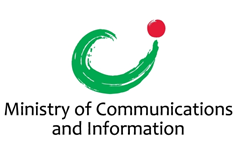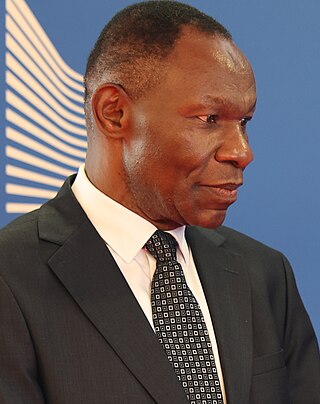Telecommunications had an early beginning in Mauritius, with the first telephone line installed in 1883, seven years after the invention of the telephone. Over the years, the network and telephony improved. By the late 20th century, the rapid development and convergence of information and telecommunications technologies gave rise to an ICT industry on the island along with many incentives provided by the government. The government thus aims to make the ICT sector the 5th pillar of the Mauritian economy and Mauritius a Cyber Island. Historically, the country is known for tourism, rather than its call centers and business process outsourcing.
The Association for Progressive Communications (APC) is an international network of organizations that was founded in 1990 to provide communication infrastructure, including Internet-based applications, to groups and individuals who work for peace, human rights, protection of the environment, and sustainability. Pioneering the use of ICTs for civil society, especially in developing countries, APC were often the first providers of Internet in their member countries.

Information and communications technology (ICT) is an extensional term for information technology (IT) that stresses the role of unified communications and the integration of telecommunications and computers, as well as necessary enterprise software, middleware, storage and audiovisual, that enable users to access, store, transmit, understand and manipulate information.
Daffodil International University (DIU) is a private research university located in Daffodil Smart City, Birulia, Savar, Dhaka, Bangladesh. It was established on 24 January 2002 under the Private University Act of 1992. DIU is the largest private university in Bangladesh by area.
Information and communication technology in agriculture, also known as e-agriculture, is a subset of agricultural technology focused on improved information and communication processes. More specifically, e-agriculture involves the conceptualization, design, development, evaluation and application of innovative ways to use information and communication technologies (ICTs) in the rural domain, with a primary focus on agriculture. ICT includes devices, networks, mobiles, services and applications; these range from innovative Internet-era technologies and sensors to other pre-existing aids such as fixed telephones, televisions, radios and satellites. Provisions of standards, norms, methodologies, and tools as well as development of individual and institutional capacities, and policy support are all key components of e-agriculture.

The Ministry of Digital Development and Information is a ministry of the Government of Singapore responsible for overseeing the development of the infocomm technology, media and design sectors, as well as the government's information and public communication policies. It is also responsible for maintaining the national library, national archives and public libraries.

V. K. Samaranayake (Sinhala:වී.කේ.සමරනායක) pioneered computing & IT development industry and usage in Sri Lanka and thus considered as the "Father of Information Technology" in Sri Lanka. He was a Professor of Computer Science and former Dean of the Faculty of Science, University of Colombo. Prof Samaranayake played a major role in the development of IT and IT related education in Sri Lanka. He was at the time of his death the chairman of the Information and Communication Technology Agency (ICTA) of Sri Lanka and was the founding and former director of the University of Colombo School of Computing (UCSC).
Icta is a genus of moths.

The Information and Communication Technology Agency is the lead agency in Sri Lanka for implementation of information and communications technology (ICT) initiatives by the Government of Sri Lanka. It was established to develop the economy of Sri Lanka through ICT. To this end, it works to improve the country's technological capacity, such as building infrastructure, and the readiness of its people, through education and human resources. It is also active in developing regulations around the use of technology and disseminating information worldwide about Sri Lankan ICT. Its current Chairman is Prof. Malik Ranasinghe.

K M Baharul Islam is presently the Chairperson of Centre of Excellence in Public Policy and Government at Indian Institute of Management Kashipur. He served as the Dean (Academics) during 2019-2021 at the same institute. He was elected as a Fellow of the Royal Asiatic Society of Great Britain and Ireland on 18 March 2020. Since October 2021, he is a visiting professor at the London School of Economics.
The Communications Authority of Kenya (CA) is the independent regulatory agency for the ICT industry in Kenya with responsibilities in telecommunications, e-commerce, broadcasting,cyber security, and postal/courier services. The CA is also responsible for managing the country's numbering and frequency spectrum resources, administering the Universal Service Fund (USF) as well as safeguarding the interests of users of ICT services.

The Information and Communication Technologies Authority (ICTA), is a national telecommunications regulatory and inspection authority of Turkey. It was formerly known as the Telecommunications Authority.
Shem Odongo Ochuodho is a Kenyan politician. He represented Rangwe constituency in Homa-Bay County between 1997 and 2002 and later became a computer consultant. He also serves as the chair of Kenya Diaspora Association.
The Multimedia University of Kenya (MMU) is a public university located in Nairobi. The university offers IT & related courses, Mass media, Business, Engineering, Physical Sciences and Social sciences education.

Professor Elijah Bitange Ndemo, a global technocrat and currently serving as Kenya’s Ambassador to the Kingdom of Belgium and the European Union. Professor Ndemo is also an academic and newspaper columnist with the Kenyan newspaper Daily Nation and its sister publication, the Business Daily. He currently serves part-time as a Professor of Entrepreneurship at the University of Nairobi’s Business School. He teaches and researches entrepreneurship and research methods, with most of his research work being focused on ICT within small and medium enterprises, and their influence on economic development in Kenya. Previously served as the Permanent Secretary in the Ministry of Information and Communication, from 2005 to 2013 under the former Kenyan president Mwai Kibaki. He was awarded the prestigious presidential Chief of the Burning Spear of Kenya (CBS) for his distinguished services in 2006.
Information Technology in Sri Lanka refers to business process outsourcing, knowledge process outsourcing, software development, IT Services, and IT education in Sri Lanka. Sri Lanka is always ranked among the top 50 outsourcing destinations by AT Kearney, and Colombo and ranked among "Top 20 Emerging Cities" by Global Services Magazine. The export revenue of this industry grew from USD 213 million in 2007 to USD 1.2 billion in 2021.

The Ministry of Posts, Telecommunications and Information Technology is a Bangladeshi government ministry. It contains two divisions. It was formed on 10 February 2014, following the general election in January 2014.







